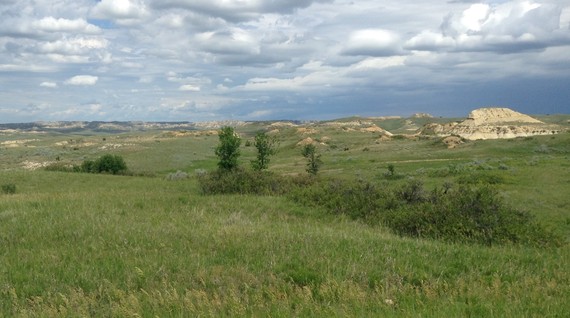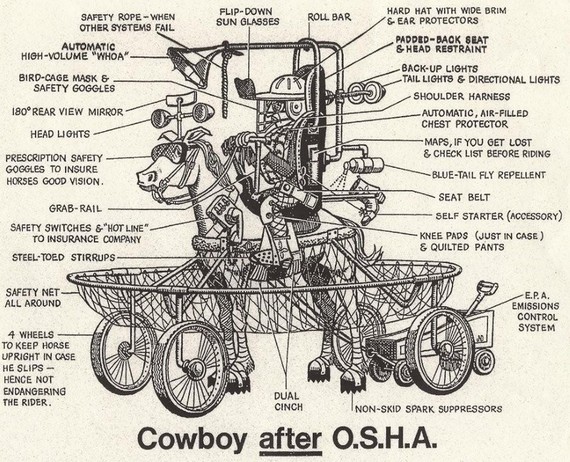Watching the election returns on Tuesday was a constant reminder of a place that will always be home for me: Montana. A red state, it supported Trump over Clinton as expected by a wide margin. But when Trump also gained enough votes in similar areas of the country to win the electoral vote, I was not as surprised as most of the nation seemed to be.
I grew up in the 1950s and '60s on a wheat and cattle ranch in eastern Montana. Our neighborhood of some 10 or 12 farming families defined our reality, explained the world. Members of the community watched out for each other: when accident, illness or other disaster befell, neighbors were there to help. There was a pervasive sense of responsibility for the well-being of those around us. When I think about growing up in a "rural community," I remember this: after my brother took over the family ranch he was hospitalized late one summer in the 1990s with encephalitis, and was for a time totally disabled. It was that critical window of time in August when the bulk of the year's income depended on getting his aging equipment running to harvest the wheat crop. Even though twelve-hour days are normal for everyone once the harvest starts, several neighbors were able to break away from their own work long enough to harvest my brother's wheat. They knew that he would have done the same for them.
Our lives centered on the changing of seasons and the work each involved. Our one-room elementary school held community celebrations for every Halloween, Christmas, and eighth-grade graduation, as well as a monthly square dance. We were very far removed from the big city world of dense populations, slums, traffic jams, commuting to work, urban crime, drug abuse (although that came, eventually) and unemployment. Race relations were a mysterious problem since the only non-white residents of the county were a small group of Latino families who had long been integrated into our small-town social structure. Government regulations that originated in that faraway world were the topic of ridicule but also of heated discussions. The widely shared cartoon from the 1970s of a cowboy being subjected to OSHA regulations typified our alienation from the world of big cities and big government.
That vast distance between Montana and Washington, DC included a clear sense that Congress and government agencies there didn't understand the reality of our lives, nor did they care to understand it. How do people respond to such alienation? Mistrust, along with a level of fear when the mistrusted element also exerts power. Fear and mistrust require a response, and by the 1990's, Montana was home to the Montana Militia movement, with some of the most permissive gun laws in the United States.
Even though I've lived most of my adult life in US cities I've never stopped considering myself a Montanan. I return to the family ranch as often as possible, and every trip home brings me face to face with the perceptions of the population in a red state. My conversations with family members are always deeply enlightening. They leave me at times dismayed at the cavernous differences in our perceptions of the rest of the world, but often something else emerges: commonalities, agreement, understanding.
A few examples. Some years ago when, in response to the 9-11 attacks, our military invaded Afghanistan and later Iraq - my conservative brother was irate, demanding to know what right we had to take those actions. Although he's a strong advocate of virtually no restrictions on gun ownership, he is also a ferocious advocate for gun safety. He's a highly skilled target shooter (a hobby that to me seems as good as any) and a very gentle man. What explains the differences in our thoughts about gun control? In addition to mistrust and fear of Big Government, he hasn't lived as I have in cities like Baltimore with a constant and realistic fear of the risk of being shot. Our life experiences since childhood have been vastly different.
Yet we agree on many important issues. I've spent time lately on work in opposition to the TransPacific Partnership (TPP) trade agreement. Until recently many Americans had no idea what the TPP represented, but my family members not only understood but were deeply opposed to it, for reasons similar to my own. The bloated military budget, the dangers of the growing use of military equipment against citizens by civilian police forces, fury at the "get-off-scot-free" coddling of the banking and financial establishment after the 2008 economic meltdown -- all are areas of basic agreement. We have many similar rational, well-thought-out responses to worrying trends in our country.
Voters in many rural areas all over the U.S. heavily favored candidate Trump over candidate Clinton. Was that simply an irrational attraction to a pompous narcissist? I think it was largely something else. My pre-election conversations in Montana included discussions in which Trump was characterized as crazy, erratic, even frightening. But a vote for the candidate who personified the established order that they so mistrusted, and who spoke of them as "deplorables," was unthinkable. Some 15% of those casting ballots nationally did so for the first time; many of them were the "undecided" or "missing" voters who finally believed they had a choice and emerged to support the rogue candidate. Other votes for Trump were protests against the Republican Party itself, which also had ignored their interests. Trump was clearly a different option, providing hope that they were finally being heard.
It's hard to think clearly about how we in the progressive community can actively resist the potential disasters of a Trump presidency. That we must do so is not a question. But I hope that process includes developing a genuine understanding and even a concern for the worldview of those Trump voters in the red states. They're an important part of America. They always have been.

